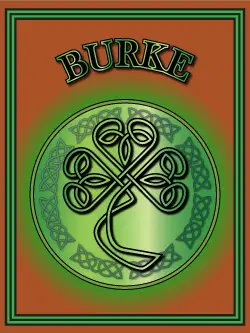The name Burke has its origins in the English aristocracy. It was first recorded in the 9th century by Burhred, King of West Mercia.
There are several variations of the name including Burk, Burgh, Bourke, Burgo and De Burgh. Burke means ‘fortified hill’ in Old English. In pre 7th century England there were villages called Burgh in Suffolk and Lincolnshire and early Burkes would have come from both places.
In 1269-70, William de Burgo of Burgh, Suffolk supported Strongbow, Earl of Pembroke in the Anglo-Norman invasions and the name arrived in Ireland.
Richard Óg de Burgh
The name Burgh became popular in Ireland hundreds of years later when they became the first Earls of Ulster and Clanricard. The name ‘Burke’ in Ireland comes from Richard Óg de Burgh who was the second Earl of Ulster and third Baron of Connacht in the 13th and 14th centuries.
Richard Óg means ‘Richard the young’. This could be either to distinguish him from his grandfather, Richard Mór or could be a reference to the fact that he was still a young man in 1271 when he became an Earl.
He was known as the ‘Red Earl’ and was good friends with the King of England, Edward I. He was the most powerful earl in Ireland and his daughter married King Robert of Scotland.
However, despite his daughter’s marriage, Richard supported his friend King Edward over his son-in-law King Robert when England and Scotland went into battle.
Collapse of power
Later, King Robert’s younger brother, Edward Bruce invaded Ulster in an attempt to extend his family’s power. Edward defeated Richard and became High King of Ireland.
Meanwhile, Richard also lost his power in Connacht following an uprising in 1315 by Felim Ó Conchobair, an ancestor of the O’Connors. Felim was killed in battle a year later but his son and grandson went on to be kings of Connacht.
Having lost control of Connacht, Richard Óg did at least manage to regain power in Ulster when another of his sons-in-law, Sir John de Bermingham, led an Anglo-Irish army in the Battle of Faughart in 1318.
Edward Bruce was killed and his severed head was sent to England to be put on display for King Edward II.
Famous Burkes from around the world
Edmund Burke was an Irish philosopher and politician. He sat in the English House of Commons and supported the Americans in the War of Independence. Today he is thought of as the father of modern English Conservatism.
Ciarán Burke was a musician who found fame as a member of the legendary Irish folk band the Dubliners.
Solomon Burke was a Soul and R&B singer. His hits include ‘If You Need Me’, ‘Down in the Valley’ and ‘Got to Get You Off My Mind’. He has been described as the ‘most unfairly overlooked singer’ of his genre.
He has been nicknamed the ‘king of Rock ‘n’ Soul’, the ‘Bishop of Soul’ and even the ‘Muhammed Ali of Soul’. In 2001 he was inducted into the Rock and Roll Hall of Fame.
Clem Burke is the drummer for the American punk band Blondie. Blondie had several hits in the 1970s and 80s including ‘Heart of Glass’, ‘On Way or Another’ and ‘Call Me’.
Billy Burke is an American actor who has appeared in the Twilight Saga movies and the hit TV series 24.
Boxer James Burke
James Burke was a London boxer in the early 19th century. He lived in extreme poverty and died aged just 35. He was one of England’s early heavyweight boxing champions.
He beat Irish champion, Simon Byrne in a fight that lasted over three hours. Byrne died three days later and Burke was arrested for murder. He was acquitted but found it difficult to find opponents.
He headed to America and fought Irish champion Sam O’Rourke in New Orleans. O’Rourke took such heavy punishment that the crowd began to riot and Burke had to flee on horseback.
After returning to England he fought for more titles but in one fight the referee was forced to stop the fight and disqualify Burke by members of his opponent’s gang.
William Burke
William Burke was an infamous Irish murderer and grave robber who lived in Edinburgh, Scotland from 1792 to 1829. In 1828, Burke and his accomplice, William Hare, killed several people over a ten month period.
The murders became known as the ‘Burke and Hare murders’ or the West Port murders. Burke and Hare sold the bodies of 16 victims to Dr Robert Knox who used them in lectures about anatomy. Both men were caught and sentenced to death by hanging in 1829.
